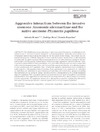Identificador persistente para citar o vincular este elemento:
https://accedacris.ulpgc.es/jspui/handle/10553/106283
| Título: | Aggressive interactions between the invasive anemone Anemonia alicemartinae and the native anemone Phymactis papillosa | Autores/as: | Brante, Antonio Riera, Rodrigo Riquelme, Pamela |
Clasificación UNESCO: | 251005 Zoología marina 2408 Etología |
Palabras clave: | Interspecific competition Agonistic behavior Invasion Chilean coast |
Fecha de publicación: | 2019 | Publicación seriada: | Aquatic Biology | Resumen: | The distribution range expansion of species mediated by natural or anthropic mechanisms is one of the main causes of changes in biodiversity patterns. Anemonia alicemartinae is a cryptogenic species found along the coasts of the Southeast Pacific Ocean. This species has ex - panded its range by >1900 km along the Chilean coast throughout the last 50 yr. A. alicemartinae co habits with the native anemone Phymactis papillosa in the low intertidal zone, and given the limited mobility of both species, limited space could encourage aggressive behavior between them. P. papillosa shows different color phenotypes, and, as in other anemone species, color is associated with its level of aggressiveness. Here, we evaluated the aggressive behavior of A. alicemartinae on 2 color morphotypes of P. papillosa. Also, intraspecific agonistic interactions were considered in individuals of A. alicemartinae from 2 localities. Four experiments were conducted: (1) individual vs. individual, (2) individual vs. group forming a frontal line, (3) individual vs. group surrounding the individual and (4) group vs. group. Results showed A. alicemartinae to be a weak competitor against P. papillosa. The cryptogenic species lost more contests with green P. papillosa than with the red phenotype. Few aggressive interactions between conspecifics of A. alicemartinae were found. Results suggest that the expansion success of A. alicemartinae could be explained by alternative strategies, such as escape behavior, asexual reproduction and high dispersal potential. | URI: | https://accedacris.ulpgc.es/handle/10553/106283 | ISSN: | 1864-7782 | DOI: | 10.3354/ab00718 | Fuente: | Aquatic biology [ISSN 1864-7782], v. 28, p. 127–136 |
| Colección: | Artículos |
Citas de WEB OF SCIENCETM
Citations
5
actualizado el 15-feb-2026
Visitas
262
actualizado el 15-ene-2026
Descargas
97
actualizado el 15-ene-2026
Google ScholarTM
Verifica
Altmetric
Comparte
Exporta metadatos
Los elementos en ULPGC accedaCRIS están protegidos por derechos de autor con todos los derechos reservados, a menos que se indique lo contrario.
